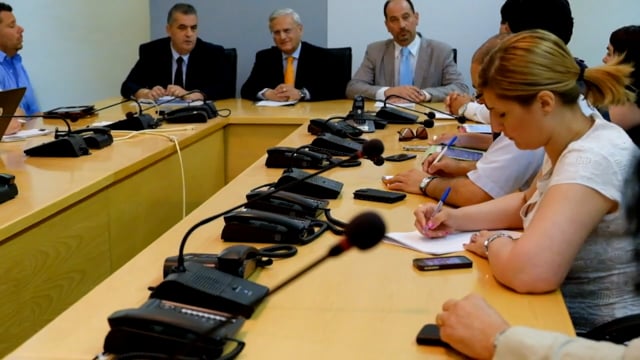[WATCH] Amendments to planning laws only at committee stage
Government ministers say second reading during which three new planning laws are being discussed in marathon parliamentary sessions must go ahead.


Government is insisting that a second reading during which three new planning laws are being discussed in marathon parliamentary sessions must go ahead.
But the committee stage, where amendments are discussed to make changes in the law, will take place after the public consultation period is over.
The Opposition has proposed a delay in the summer recess or an early reconvening of parliament in the fall to ensure that discussion in the plenary takes place after the conclusion of the public consultation in two weeks' time.
The public consultation was extended to the end of the month after NGOs protested after they were given a 24-hour notice to attend a meeting of parliament’s standing committee.
"The second reading of a bill is where MPs discuss general guidelines without zooming-in on specific issues. It is at committee stage within the parliamentary select committees that the nitty-gritty is delved into," environment minister Leo Brincat said today.
As regards the approval of the new Strategic Plan for the Environment and Development (SPED), Brincat and parliamentary secretary for planning Michael Falzon said that the government had taken on board some of the suggestions of the NGOs and adopted them.
But government has crucially rejected appeals by NGOs to remove two clauses which enable government to proceed with ODZ development whenever no feasible option is found within development zones and whenever an ODZ development is deemed to be “sustainable”.
According to Din l-Art Helwa these amendments render “null any improvements that have been incorporated into the final SPED draft.”
Asked about the NGO's criticism of the SPED despite government's insistence that it took on board their recommendations, Falzon said: "The reality is that there are some people who want to leave things unchanged as they were 20 years ago. We are ready to recognise that Malta has changed. We had 37 policies since 1992 and they can't remain identical to how it was."
Brincat accused the Opposition of resorting to "tactics of the past" and said that the opposition's votes against the SPED meant that they were weakening it. He pointed out that at environment committee stage, the PN had abstained.
Falzon hit out at the PN saying that their statements and "confusion about the demerger and the SPED" showed incongruence and that "they're not up to it". "They definitely do not have the credentials to talk about the environment or else we wouldn't be here discussing these changes"
Falzon said the Opposition's no vote was "an affront to the NGOs and their proposals".
Along with whip Godfrey Farrugia, the two ministers gave a timeframe on the consultation that went on and a second consultation at environment committee stage. Farrugia said the labour parliamentary group, contrary to the Pn group, had returned back to the committee with its amendments after hearing what the NGOs had to say.
"The difference between the government and opposition is that we acted: we listened, we doubled the consultation period on the sped and presented a document that the previous administration should have worked on."








.jpg)




.jpg)






.png)


